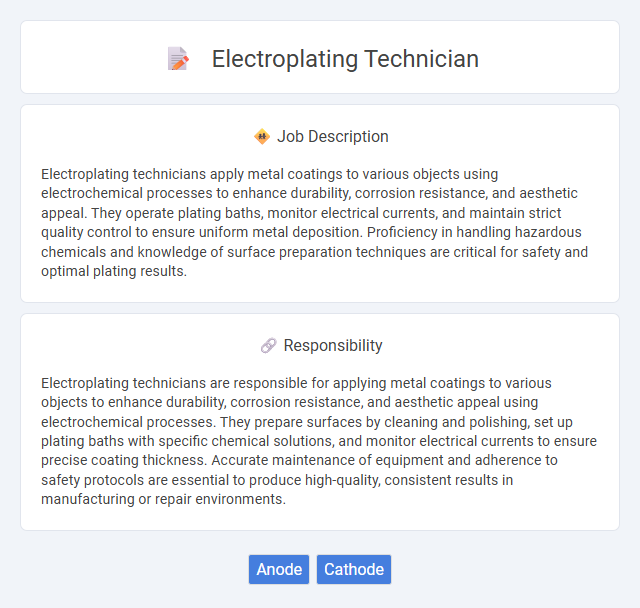
Electroplating technicians apply metal coatings to various objects using electrochemical processes to enhance durability, corrosion resistance, and aesthetic appeal. They operate plating baths, monitor electrical currents, and maintain strict quality control to ensure uniform metal deposition. Proficiency in handling hazardous chemicals and knowledge of surface preparation techniques are critical for safety and optimal plating results.
Electroplating technician roles may likely suit individuals who are detail-oriented and comfortable working with chemicals and precision equipment in controlled environments. Those with a tendency toward patience and steady hand coordination could probably thrive, while people prone to allergies or sensitivity to chemical exposure might find this job challenging. A strong focus on safety protocols is expected to be essential for anyone considering this career path.
Qualification
An Electroplating Technician typically requires a high school diploma or equivalent, with specialized training in chemistry, metallurgy, or industrial technology preferred. Essential qualifications include proficiency in applying metal coatings through electrochemical processes, understanding of safety protocols, and experience with plating baths and equipment maintenance. Strong analytical skills and attention to detail are critical for ensuring quality control and adherence to production standards in electroplating operations.
Responsibility
Electroplating technicians are responsible for applying metal coatings to various objects to enhance durability, corrosion resistance, and aesthetic appeal using electrochemical processes. They prepare surfaces by cleaning and polishing, set up plating baths with specific chemical solutions, and monitor electrical currents to ensure precise coating thickness. Accurate maintenance of equipment and adherence to safety protocols are essential to produce high-quality, consistent results in manufacturing or repair environments.
Benefit
Electroplating technicians likely benefit from acquiring specialized skills in applying metal coatings, which may enhance their career stability and job prospects. The role probably offers experience with advanced plating technologies, potentially increasing marketability in manufacturing and automotive industries. Opportunities for overtime and steady demand for corrosion-resistant products might also contribute to attractive compensation and job security.
Challenge
Electroplating technicians may often encounter challenges related to maintaining consistent quality while working with complex metal coating processes. The probability of facing issues like equipment malfunctions or chemical imbalances could require strong troubleshooting skills. Adapting to evolving technology and strict environmental regulations might also pose ongoing difficulties in this field.
Career Advancement
Electroplating technicians possess specialized skills in applying metal coatings, making them essential in manufacturing industries such as automotive and aerospace. Career advancement opportunities include progressing to supervisory roles, quality control specialist positions, or moving into chemical process engineering. Gaining certifications in surface finishing and continual training in advanced electrochemical techniques significantly enhances promotion prospects within industrial and research sectors.
Key Terms
Anode
An Electroplating Technician specializes in applying metallic coatings using electrolytic cells where the anode plays a crucial role by serving as the source of metal ions in the plating solution. Maintaining the anode involves monitoring its condition to ensure uniform metal dissolution, which directly impacts the quality and thickness of the plated layer. Expertise in managing anode material composition and surface integrity optimizes coating adherence and enhances corrosion resistance in finished products.
Cathode
Electroplating technicians specialize in applying metal coatings to cathodes through controlled electrochemical processes to enhance durability and corrosion resistance. Precision in maintaining current density and electrolyte composition directly affects the quality and uniformity of the cathode plating. Mastery of cathode preparation and post-plating inspection ensures adherence to industry standards and optimal product performance.
 kuljobs.com
kuljobs.com